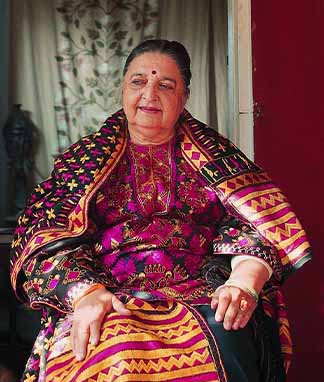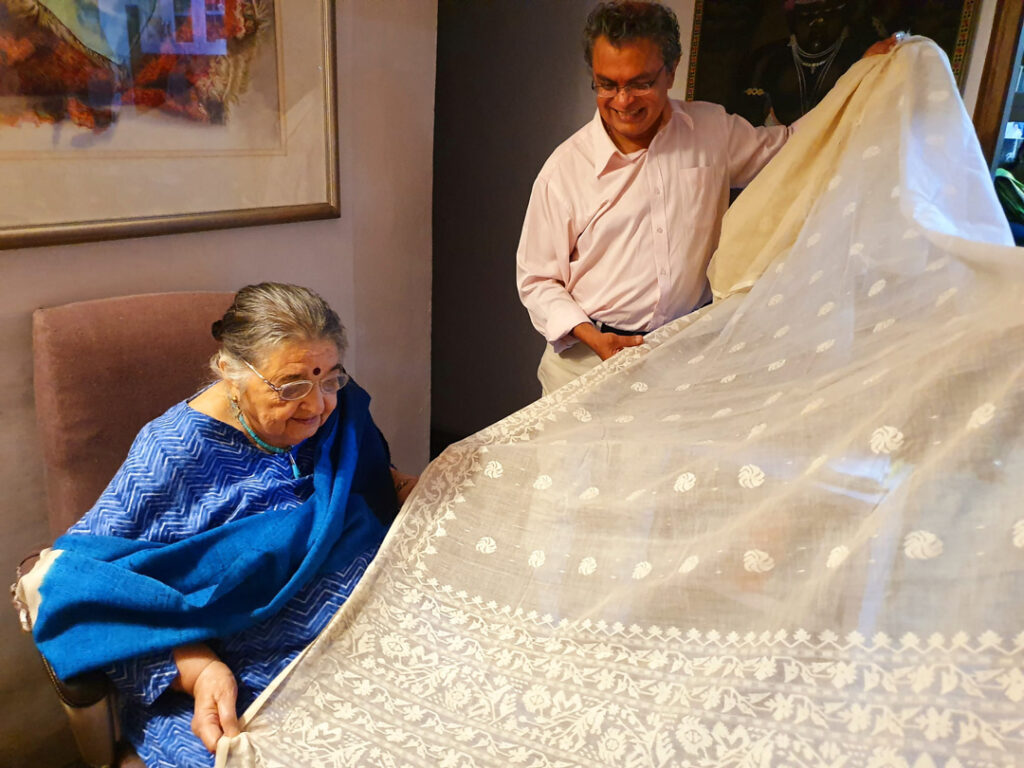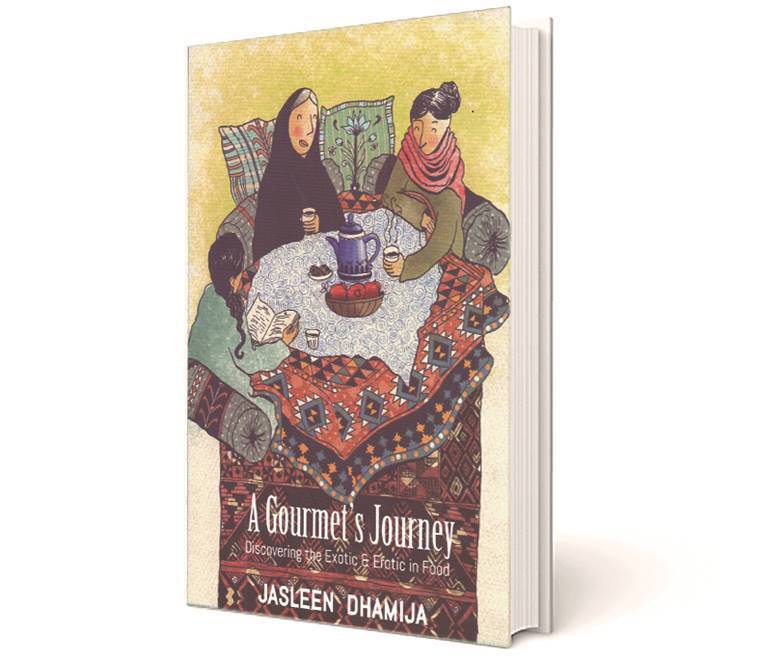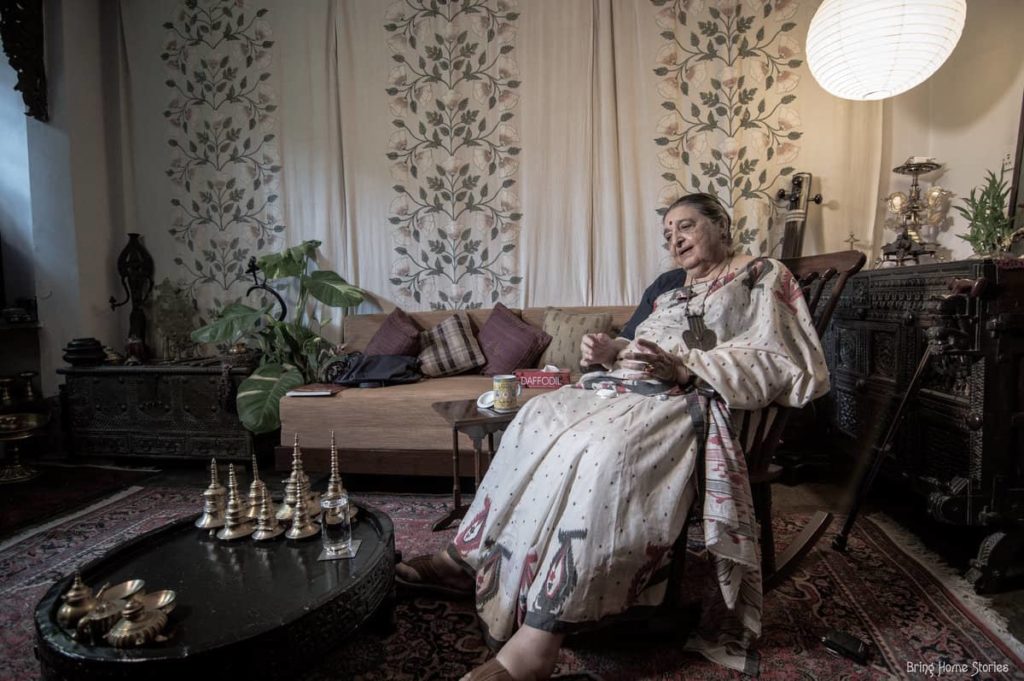Smriti Malhotra
Jasleen Dhamija, was a highly esteemed historian and a revered champion of traditional Indian crafts, has left an indelible mark on the preservation and promotion of the country’s rich cultural heritage. Through her extensive research, significant policy contributions, and unwavering dedication, she has become a beacon, illuminating the narrative surrounding Indian textiles and crafts, inspiring generations to appreciate and safeguard these remarkable art forms.

Born in Abbottabad, present-day Pakistan, Dhamija’s journey began in a city steeped in history and tradition. In 1940, her family relocated to New Delhi, India, where she found herself captivated by the allure of handicrafts. Her creative spirit took flight during her time at the Presentation Convent School and the University of Delhi, where she honed her skills by crafting exquisite bags and lampshades, showcasing her innate talent and deep connection to India’s vibrant craft heritage.
In 1954, Dhamija embarked on her professional career at the All India Handicrafts Board. Collaborating closely with the renowned Kamaladevi Chattopadhyay, she embarked on a transformative journey, traversing the length and breadth of India, meeting artisans, and spearheading initiatives to revive the handicrafts and handloom sectors. This hands-on experience allowed her to develop a profound understanding of the challenges faced by craftsmen, inspiring her to write a biography that immortalised Chattopadhyay’s remarkable contributions to the craft movement in India.

Dhamija’s expertise and passion transcended national boundaries. As an advisor and consultant for esteemed organisations such as the United Nations Development Project and the World Bank, she ventured into diverse landscapes, working on projects that spanned the globe. From her exploration of rural non-farm employment in Iran to her efforts to revitalise crafts practices and empower women’s livelihoods across twenty-one African countries, her global perspective enriched her understanding of textiles and crafts, further fueling her determination to preserve their essence.
The depth and breadth of Dhamija’s literary contributions are awe-inspiring. Her published works are a testament to her deep knowledge and passion for Indian textiles and crafts. “Indian Folk Arts and Crafts” (1992) celebrates the artistry and cultural significance of a wide range of traditional crafts. “Woven Magic: The Affinity Between Indian and Indonesian Textiles” (2002) explores the fascinating connections between these two rich textile traditions. “Asian Embroidery” (2004) delves into the intricate world of embroidery techniques across Asia, showcasing the beauty and diversity of this ancient art form. Furthermore, her magnum opus “Baluchars: The Woven Narrative Silks of Bengal” (2019) unravels the captivating stories woven into the fabric of Bengal’s exquisite silk saris.

These publications, along with numerous others, serve as a testament to Dhamija’s meticulous research, profound understanding, and unyielding dedication to documenting and preserving India’s textile heritage. Her words not only educate enthusiasts and scholars but also serve as a catalyst for the continued appreciation and revitalization of traditional crafts.
Beyond her literary contributions, Dhamija’s influence extended to the curatorial realm. She co-curated remarkable exhibitions that showcased the magnificence of textiles and crafts, such as “Threading the Commonwealth: Textile Tradition, Culture, Trade, and Politics” (2006) in Melbourne, Australia, and “Powercloths of the Commonwealth” (2010) in New Delhi. As an esteemed educator, Dhamija shared her knowledge and passion at prestigious institutions such as the National Institute of Design in Ahmedabad, the National Institute of Fashion Technology in New Delhi, the University of Minnesota in the USA, and the University of Canberra in Australia. Her guidance and mentorship nurtured countless individuals, fostering a new generation of artisans, researchers, and advocates dedicated to the preservation and promotion of traditional crafts. Renowned for her contributions to Indian textiles and crafts, Jasleen embarked on a remarkable culinary journey that revealed her profound love affair with food.Dhamija’s exploration of flavours and aromas added an extra layer of richness and delight to her multifaceted life. Her passion for gastronomy found expression in her two published cookbooks: “The Joy of Vegetarian Cooking” (2000) and “Cooking For All Seasons” (2003). These culinary treasures were a gateway into her gastronomic world, sharing a delightful blend of traditional recipes, culinary anecdotes, and the essence of Indian flavours. Through these books, she invited readers to savour the diverse and delectable vegetarian cuisine that India has to offer.

In many ways, Dhamija’s culinary pursuits mirrored her dedication to preserving traditional crafts. As she championed heritage textiles, she also recognized the significance of preserving and promoting culinary traditions passed down through generations. Jasleen Dhamija’s legacy will forever shine brightly in the realm of Indian textiles and crafts. Her tireless efforts, extensive research, and influential publications have laid the foundation for the continued appreciation and preservation of these treasured art forms. Her life’s work serves as an inspiration for all those who endeavour to celebrate and safeguard the cultural heritage that resides within every thread, stitch, and masterpiece.
To read about Kamaladevi Chattopadhyay Click Here

Contributor






